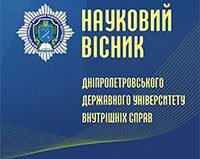Oleh LEVIN
LEVIN O. (2023), THE USE OF FAKE ACCOUNTS AS A TOOL OF SPECIAL INFORMATION AND PSYCHOLOGICAL OPERATION DURING THE UKRAINIAN-RUSSIAN WAR; Scientific Bulletin of Dnipropetrovsk State University of Internal Affairs, № 2, 89-94
DOI: 10.31733/2078-3566-2023-2-89-94
ABSTRACT. The 21st century has been marked by new methods of information warfare. Manipulation of consciousness and influence on the thoughts and decisions of the population successfully support armed methods of warfare. A distorted and deliberately false portrayal of events affects their acceptance by the population and, as a consequence, sows doubt and mistrust in the victory in the war, generates aggression and hatred towards other nations and strengthens discrimination. At the same time, the information may be presented in such a way that those affected by the information influence will consider its consequences to be those caused by their own decisions, the only possible and correct ones.
Fake news (from the English word «fake») is false information that is purposely disseminated by interested parties who pursue their (usually political) goals or who want to earn money from Internet traffic.
This article is devoted to a relatively new tool of information warfare against Ukraine – fake accounts and bot farms, their general characteristics and methods of counteracting this phenomenon on the Internet as an effective tool of SIPO during russia’s full-scale invasion of our land. The study regulates the peculiarities of the formation, impact and operation of bots and bot farms, their signs and properties, provides examples of the use of fake information, and provides recommendations for recognising fake messages and resources. Attention is drawn to the importance of combating this, especially when our country is waging a heroic struggle against the invaders who use all types of struggle against us: from armed to informational, using against us and not allowed methods.
Keywords: bot farms, fake accounts, disinformation, Internet resources.
- References:
- Molodetska, K. V. (2016) Tekhnolohiia vyiavlennia orhanizatsiinykh oznak informatsiinykh operatsii u sotsialnykh internet-servisakh [Technology for identifying organisational features of information operations in social Internet services]. Problemy informatsiinykh tekhnolohii. № 2. рр. 84–93. URL: http://nbuv.gov.ua/UJRN/Pit_2016_2_12. [in Ukr.].
- Marushchak, A. I. (2022) Mizhnarodno-pravovi pidkhody ta natsionalno-pravove rehuliuvannia protydii dezinformatsii [International legal approaches and national legal regulation of countering disinformation]. Informatsiina bezpeka liudyny, suspilstva, derzhavy. Issue 1–3(31–33), рр. 64–71. URL: http://journals.uran.ua/ispss/article/view/260235. [in Ukr.].
- Zelinskyi, S. (2015) Dydaktychni pryntsypy osobystisno oriientovanoho navchannia z vykorystanniam informatsiino-komunikatsiinykh tekhnolohii [Didactic principles of personality-oriented learning with the use of information and communication technologies]. Molod i rynok. № 6, рр. 141–144. URL: http://nbuv.gov.ua/UJRN/Mir_2015_6_32. [in Ukr.].
- Zinchenko, O. V. Merezhevi feiky yak psykholohichna problema [Network fakes as a psychological problem]. URL: https://www.newlearning.org.ua/system/files/sites/default/files/zagruzheni/zinchenko_olexandr_2020.pdf. [in Ukr.].
- Kitsa, M. O. (2016) Feikova informatsiia v ukrainskykh sotsialnykh media: poniattia, vydy, vplyv na audytoriiu [Fake information in Ukrainian social media: concept, types, impact on the audience]. Naukovi zapysky Ukrainskoi akademii drukarstva. № 1. рр. 281–287. URL: http://www.irbis-nbuv.gov.ua/cgi bin/irbis_nbuv/cgiirbis_64.exe?I21DBN=LINK&P21DBN=UJRN&Z21ID=&S21REF=10&S21CNR=20&S2 1STN=1&S21FMT=ASP_meta&C21COM=S&2_S21P03=FILA=&2_S21STR=Nz_2016_1_37. [in Ukr.].
- Kurban, O. (2018) Feiky u suchasnykh media: identyfikatsiia ta neitralizatsiia [Fakes in modern media: identification and neutralisation]. Bibliotekoznavstvo. Dokumentoznavstvo. Informolohiia. № 3. рр. 96– 103. URL: http://www.irbis-nbuv.gov.ua/cgi-bin/irbis_nbuv/cgiirbis_64.exe?I21DBN=LINK&P21DBN= UJRN&Z21ID=&S21REF=10&S21CNR=20&S21STN=1&S21FMT=ASP_meta&C21COM=S&2_S21P03= FILA=&2_S21STR=bdi_2018_3_15. [in Ukr.].
- Konstytutsiia Ukrainy [The Constitution of Ukraine] vid 28 chervnia 1996 roku. Vidomosti Verkhovnoi Rady Ukrainy. 1996. № 30. Art. 141. [in Ukr.].
- Tsyvilnyi kodeks Ukrainy [Civil Code of Ukraine] : Zakon Ukrainy vid 16.01.2003. URL: https://zakon.rada.gov.ua/laws/main/435-15#Text. [in Ukr.].
- Pro informatsiiu [On information] : Zakon Ukrainy vid 02.10.1992. Vidomosti Verkhovnoi Rady Ukrainy. 1992. № 48. Art. 650. [in Ukr.].
- Kodeks Ukrainy pro administratyvni pravoporushennia [Code of Ukraine on Administrative Offences] : Zakon Ukrainy vid 10.01.2002. Vidomosti Verkhovnoi Rady Ukrainy. 1984. Dodatok do № 51. Art. 1122. [in Ukr.].
- Kryminalnyi kodeks Ukrainy [Criminal Code of Ukraine] : Zakon Ukrainy vid 05.04.2001. URL: https://zakon.rada.gov.ua/laws/show/2341-14#Text. [in Ukr.].
- Z pochatku viiny SBU likviduvala 5 vorozhykh botoferm potuzhnistiu ponad 100 tys. feikovykh akauntiv [Since the beginning of the war, the SSU has eliminated 5 enemy bot farms with a capacity of more than 100,000 fake accounts]. Sluzhba bezpeky Ukrainy. URL: https://ssu.gov.ua/novyny/z-pochatku-viiny-sbu-likviduvala-5-vorozhykh-botoferm-potuzhnistiu-ponad-100-tys-feikovykh-akauntiv. [in Ukr.].
- Meta zakryla rosiiski ta kytaiski falshyvi akaunty vidomykh ZMI z feikamy pro viinu v Ukraini [Meta shut down russian and Chinese fake accounts of well-known media with fake news about the war in Ukraine]. Radio Svoboda. URL: https://www.radiosvoboda.org/a/news-meta-feyky viyna/32056257.html. [in Ukr.].
